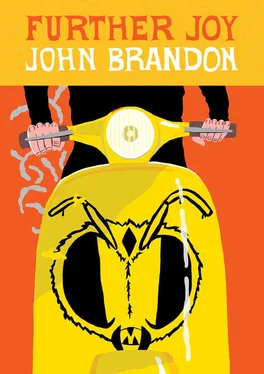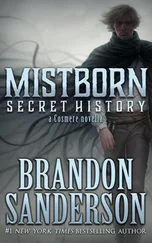John Brandon - Further Joy
Здесь есть возможность читать онлайн «John Brandon - Further Joy» весь текст электронной книги совершенно бесплатно (целиком полную версию без сокращений). В некоторых случаях можно слушать аудио, скачать через торрент в формате fb2 и присутствует краткое содержание. Год выпуска: 2014, Издательство: McSweeney's, Жанр: Современная проза, на английском языке. Описание произведения, (предисловие) а так же отзывы посетителей доступны на портале библиотеки ЛибКат.
- Название:Further Joy
- Автор:
- Издательство:McSweeney's
- Жанр:
- Год:2014
- ISBN:нет данных
- Рейтинг книги:5 / 5. Голосов: 1
-
Избранное:Добавить в избранное
- Отзывы:
-
Ваша оценка:
- 100
- 1
- 2
- 3
- 4
- 5
Further Joy: краткое содержание, описание и аннотация
Предлагаем к чтению аннотацию, описание, краткое содержание или предисловие (зависит от того, что написал сам автор книги «Further Joy»). Если вы не нашли необходимую информацию о книге — напишите в комментариях, мы постараемся отыскать её.
The New York Times
Further Joy — читать онлайн бесплатно полную книгу (весь текст) целиком
Ниже представлен текст книги, разбитый по страницам. Система сохранения места последней прочитанной страницы, позволяет с удобством читать онлайн бесплатно книгу «Further Joy», без необходимости каждый раз заново искать на чём Вы остановились. Поставьте закладку, и сможете в любой момент перейти на страницу, на которой закончили чтение.
Интервал:
Закладка:
One of the fathers followed a Mexican soap opera. The women were huge-eyed and single-minded, and the story would never end. It would outlive the father and maybe even his daughter.
To the fathers’ wonder, their daughters drank like thirty-five-year-old women — a glass of wine with dinner, a cold beer at the end of a long hot week. They ate whatever was presented, whatever was handy, with equal zest, whether braised veal or a frozen cheese pizza.
The fathers could not discern the status their daughters held among their peers. It did not seem to matter that they were not wealthy. It did not seem to matter one way or the other whether they played sports. They were free to earn high grades if they wished. Their daughters were a clique, but took no pride in this. Exclusivity and welcome occurred naturally and were accepted without fuss. It seemed nerds no longer existed as they once had, or sluts. There was peer pressure to do such things as recycle and volunteer.
Each father understood that he could not tell how attractive his daughter was. Each assumed his daughter was beautiful because she looked similar to the other girls she hung around with, who were without doubt beautiful.
The fathers did not pal around with one another.
One of the fathers’ daughters had a suitor, a white boy named Tyrone. The father did not know if the boy’s parents had named him for a joke or a statement or if somehow Tyrone was a family name for them or what.
One of the fathers was in debt. He’d sold his crepe shop but no one knew at how great a loss. Now he cooked at an upscale breakfast place, folding mushrooms and lobster into omelets. He didn’t know what people thought — that he’d gotten weary of the responsibility of owning, maybe, or that he wanted to stay in shape in the kitchen. He hadn’t allowed his daughter to notice he was broke. He took her out for sushi and then, on his days off, he ate peanut butter sandwiches alone. He had begun secretly rooting against his daughter’s impeccable grades, knowing everything would be easier for him if she didn’t get into a prestigious far-off school. He had sold things out of the back of his garage, exercise equipment and a stately, attic-smelling grandfather clock. He had sold his bottles of fine California red. He had never decided what occasion might prompt him to uncork one of the wines, what sort of joyous triumph he was waiting for, and now he’d never find out. Good things had happened and he’d let them pass, occasionally handling and dusting the bottles but never celebrating with them. His daughter was the sharpest of the girls. She was a math whiz and a shrewd judge of character. He could not stand the thought of her being disappointed in him, of letting her down.
One of the fathers’ daughters spoke four languages. Fluent Spanish, of course. Enough French to hold a conversation. Also, they had hosted a girl from Zimbabwe for several summers and the daughter had picked up enough of some African tongue to continue learning it on her own. The high school had brought in a tutor for her, a linguist from the university. Though public, it was that kind of high school.
One of the fathers, years ago, had bought his daughter a boxy antique camera. Later he found it in a spare closet and tracked down film for it on the computer and used it to take pictures of the stagnant canals that snaked through their part of town. He tried to catch the canals at low tide, when clans of exposed crabs lined the oyster beds.
The fathers depended on their daughters to keep them in the correct shoes.
When in doubt, the fathers encouraged their daughters to get enough rest and eat vegetables and to tell the truth — timeless, tried-and-true directives.
The fathers were aware of how far things were going in some quarters. It wasn’t just nose jobs and breast augmentation anymore. Girls were getting their lips plumped. Girls were having their toes worked on, so their feet would look cute in sandals and flip-flops. None of the fathers’ daughters had mentioned any of this nonsense yet, but that didn’t mean they never would.
One of the fathers hired an escort every few months, an available reward to himself for how far he’d risen in life, and against what odds. The older his daughter got, the less purely he was able to enjoy this practice.
The era the girls were growing up in had no texture. The music betrayed nothing. The generation preceding the fathers’ had been wild, and the fathers themselves had learned to be jaded, but the girls were past all that. Jadedness, for them, was an old stale religion not worth its costumes. Rebellion, to them, was quaint.
One of the fathers thought of the afternoon his daughter’s braces had been removed as the moment he’d lost her.
One of the fathers wished he could work on cars. He wished he could prop his hood in the driveway and hang that competent and hopeful lantern and take a look at a belt or hose and then straighten up to his full height while wiping his hands on a torn green rag. Men like himself, driving by on the street, would notice him and feel lost.
One of the fathers thought of one of his daughter’s friends while he lay awake at night. He thought of her during slow moments in the day, too, but in the day he only felt fond of the way she walked and the way she carefully formed words with her lips. At night it was something worse. He didn’t think in terms of being in love. He had, apparently, been in love twice before. He knew there was no dependable advantage, when smitten, to doing something about it. There were numerous disadvantages. The father had never been addicted to anything, had never been unable to control himself. He would weather this, just another secret to keep. In so many ways, he was lucky. His daughter was lucky. Her friend, with her feline face and muscled calves and shabby fingernails, was lucky — lucky to be desired by a man who did not act on his wanton fixations. When the father picked all the girls up from somewhere in his restored classic Jeep, he hoped the girl he thought about at night would sit in the passenger seat. He had no way to encourage this. When it happened, when she hopped up beside him and the rest piled in back, he felt overcome, dizzy, like he’d had whiskey and a rich dessert. Her teeth were gleaming and slightly crooked and her skin was the color of honey when the sunlight shines through it. On the inside of her ankle was a pale beauty mark in the shape of a tropical fish. Her tummy sometimes peeked out. There were soft depressions behind her ears. She regarded the father with a comfortable sort of formality. There was no chance she understood him, but she trusted him. When she was in the front seat she didn’t lean back toward the others to join the gabbing. She listened, an amused outsider, same as the father. He wondered what she would do if she ever noticed how he looked at her, but she would never notice. Or she already had. This was the father’s problem alone, not the girl’s. It was best to keep his visions plain, he knew, but the nights were soundless and aimless and in the dark he would imagine the two of them living on a meadowy ranch out west or holing up down in Central America, local children running into town to fetch them produce and rum. He imagined teaching the girl how to cook, imagined going on weekend excursions for the purpose of buying hats. He even imagined scolding her coarse etiquette, imagined her taking up cigarettes. They would buy a horse. They would read the longest novels ever written. He imagined her coming down with a swift and exotic illness, and nursing her back to health, giving her medicines with his palm cupped underneath a spoon, placing cold rags on her forehead, leading her on leisurely walks over mild hills until the gold color returned to her limbs. He imagined her desire returning as she became hale. He wouldn’t rush her, he would wait until they were lying on the humid porch during the hottest part of the day and she sighed and pushed the tiny soft arch of her foot into his hand. He even allowed himself to imagine the fallout. His own daughter’s injury. The other father’s rage. A fistfight. The law. The shame. Except that nothing was going to happen. He was unfamiliar with the abandon that caused people to commit murder or rape or break into houses over a fix, that made gamblers end up homeless, that caused old ladies to hoard knickknacks and canned goods and small pets until their houses were condemned, that turned the upbeat overweight into the grotesque obese who couldn’t leave their apartments. No, his mind was like his lawn; it could grow unruly, but there was a snug, irresistible pride in trudging out into the heat and mowing and clipping and raking. He had seen the girl in sundresses. He had seen her in men’s-style pajamas. He had seen her in a soccer uniform. He had seen her in a thin, stiff coat and high boots. He had seen her in a faded clay-colored towel almost the same shade as her skin. He had seen her in a ball gown and in a middle school graduation gown. He had seen her in a beat-up sweatshirt, eager to paint houses for the less fortunate.
Читать дальшеИнтервал:
Закладка:
Похожие книги на «Further Joy»
Представляем Вашему вниманию похожие книги на «Further Joy» списком для выбора. Мы отобрали схожую по названию и смыслу литературу в надежде предоставить читателям больше вариантов отыскать новые, интересные, ещё непрочитанные произведения.
Обсуждение, отзывы о книге «Further Joy» и просто собственные мнения читателей. Оставьте ваши комментарии, напишите, что Вы думаете о произведении, его смысле или главных героях. Укажите что конкретно понравилось, а что нет, и почему Вы так считаете.












